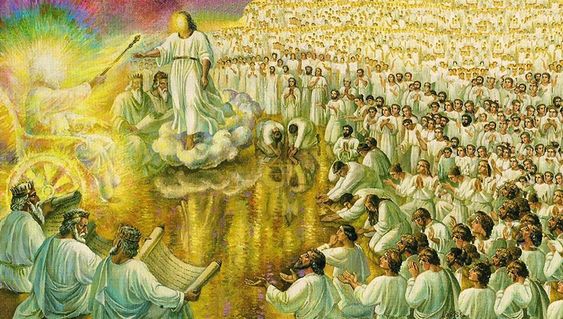
Today’s song from Sing Praise is ‘Holy, holy, holy is the Lord’. It’s described in the book as anonymous, which is a bit surprising as it’s a modern song, not an ancient hymn. Like the last two days, it’s one I’m already familiar with.
The words appear to be inspired by the Book of Revelation, in which Jesus is hailed by both humans and angels as the holy one (for having ascended to the right hand of God), the one worthy of praise (for his sacrifice for us) and the one to whom glory is due. By equating Jesus with the eternal God, this text (the original Revelation as well as the modern song) challenges any notion of all religions being equal. In particular it confronts the insistence of Judaism and, perhaps especially, Islam that God is sublime and cannot be seen or take human form. The early apostles insisted that they had indeed seen, known and touched a true incarnation of God. It is this as well as its social teaching of the equality of all people that made Christianity so subversive, and in many places still does.
The other phrase that recurs in each verse is “who was, and is, and is to come”. This refers to God being eternal, beyond time and space. It also reflects the Christian belief that by ‘Christ’ we mean not just Jesus of Nazareth but the eternal reality of the Word of God (the way God communicates with us) and that he has promised to return again in some visible form. As Very Lynn might have put it, “don’t know where, don’t know when, but we know we’ll meet again”. This is leading us gradually towards the Kingdom Season in November and then into Advent.
I can think of little to add to what Stephen wrote: the text is Revelation 4:8b, which itself is inspired by Isaiah 6:3 – both visions which inspired fear as well as awe in their beholders (“Woe is me” Isaiah 6:5; “When I saw him I fell at his feet” Rev 1:17), and if the song has a fault it is that it reduces God’s holiness to a kind of “Persil washes whiter than white” comforting quality rather than an “Our God is a consuming fire and it is a fearful thing to fall into his hands” quality.
Indeed the song is listed as anonymous in various other books, and no-one seems to know who wrote it: I would guess it originated in a student Christian Union somewhere?
At St Augustine’s Bradford I heard this song used to punctuate the Eucharistic Prayer, with v1 “Holy Holy” for the Sanctus, the “Jesus, Jesus …” verse for the “Christ has died …” section, and the “Glory, glory …” verse for the “Blessing and …” section at the end. The book mentions this possible usage.